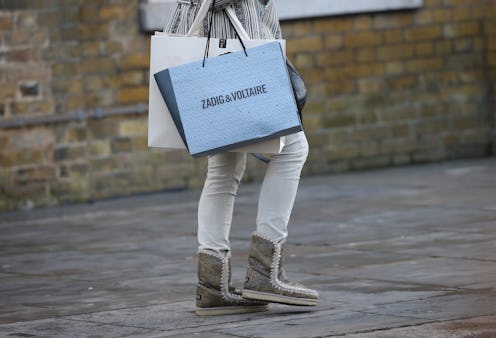Fashion
Join the Fashion Revolution!
Do you know where your clothes come from? Not where you bought them, but where they come from — how they were made, and by whom. We scarcely stop to think whether that free-flowing Urban Outfitters hippie blouse was responsibly sourced — but maybe it's time we took a deeper look at the contents of our closets. And since April 24 is Fashion Revolution Day, this is a perfect time to start.
If you haven't heard of Fashion Revolution Day before, that's because 2014 is the inaugural year. The day was created in response to an incident on April 24, 2013 when the Rana Plaza factory complex in Dhaka, Bangladesh collapsed, killing 1,133 people and injuring over 2,500 others. This lead Carry Somers and Orsola de Castroto create a campaign centered around ethical fashion.
Fashion Revolution Day seeks to become global movement, focusing on reconnecting the consumer to the behind-the-scenes realities of the garment industry. The official mission statement reads:
On 24th April each year, Fashion Revolution Day will bring everyone in the fashion value chain together and help to raise awareness of the true cost of fashion, show the world that change is possible, and celebrate all those involved in creating a more sustainable future.
"Who Made Your Clothes" is the theme of this year's event, otherwise defined on the FRD website as "transparency."
Transparency means companies know who makes their clothes – at least where they are stitched as a first port of call – and then communicate this to their customers, shareholders and staff. We are focussing specifically on supply chain transparency; by this we do not mean financial or governance. And by supply chain, we mean all those involved in making goods. A report from Baptist World Australia recently found that 61% of companies don’t know where their garments are made. [1] It’s time to change that stat!
Fast-fashion is a huge component of this problem. A lack of transparency is what enables companies to turn a blind eye to the construction of their garments, outsource labor cheaply, and charge low prices while still turning a profit. But this is also responsible for the poor working conditions that lead to incidents such as the factory collapse in Bangladesh, and extremely poor quality of life for factory workers and seamstresses overseas.
Unfortunately, consumers are part of the problem. Not everyone can afford to spend the time and money on ethical fashion. This is a reality. But too many of us who do have the means purchase fast-fashion without a second thought. An easy way to participate in Fashion Revolution Day all year long? Consciously cut down on the amount of colorful camisoles you buy at Forever21 and like stores (you don't wear them all, anyway)!
To find a Fashion Revolution Day event in your area or get more information on ethical fashion, visit the official website.
